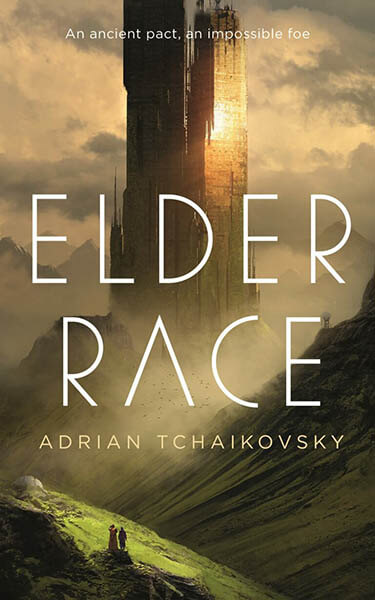On its surface, Adrian Tchaikovsky’s Hugo-nominated novella Elder Race sounds like a standard coming-of-age fantasy-adventure. Lynesse Fourth Daughter is the only person in her mother’s court who still believes in the old stories, and the only one who doesn’t want to just wait out the strange demon infestation in the Ordwood and hope it goes away. Risking her mother’s wrath, the princess and her loyal companion Esha secretly make the long trek to the Elder Tower to call on the Nyrgoth Elder, the powerful sorcerer who made a promise to her ancestor to come to her family’s aid in their time of need.
The problem is that Nyrgoth Elder isn’t a sorcerer, he’s a second-class anthropologist, and he knows all the stories are bunkum because he was there when they were happening. Nyr is the last scientist on a lonely outpost studying the ancestors of a long-lost Earth colony. He’s not even supposed to talk to the residents of Sophos 4, and going out into the wilderness with them to slay an unknown enemy will mean breaking every one of the rules. Again.
And if the Corps would just come back for me, I’d take the rapped knuckles. But they haven’t. Which, after that much time, very likely means that they won’t. Ever.

Tchaikovsky deftly uses the Arthur C. Clarke’s law of “Any sufficiently advanced technology is indistinguishable from magic” here. We get some fun moments as Nyr strolls through the wilderness and the far-flung villages without quite realizing how flabbergasted everyone is at what to him are just are basic security protocols. Nyr has to catch up to this reality fast, since a few of these security protocols will kill people if he doesn’t step in and tell everything to settle down (in ways that look an awful lot like casting spells.) But for the most part the author avoids making Lynesses’s people look like yokels, while keeping Nyr and his science grounded enough that it only looks a little handwavey at times.
All of this is done by telling the story simultaneously from two different viewpoints, alternating between Nyr and Lynesse. There’s a very appealing Unreliable Narrator thing going on, or maybe more of a Rashomon “two sides of the same story”. Nyr’s translation protocols let him speak the language, but three hundred years of linguistic drift means he’s hopelessly out of date on metaphors, context, basic expressions. Nyr keeps telling everyone that what he’s doing isn’t magic at all, but the words he’s using don’t match up with what he’s trying to say. We’ll get one chapter where Nyr tries once again to explain something, and the next chapter we experience the entertainingly bombastic proclamation of doom that Lynesse actually hears. It’s sometimes hilarious and always brilliant.
I was trying to be reassuring, but I evidently failed and now I’m not entirely sure what she made of my words.
Adding to Nyr’s frustration is the reality of his life on Sophos 4 (cut off from Earth, probably forever, slipping in and out of hibernation and writing fussy, scholarly reports that he’s more and more certain no one will ever read), and his own broken biochemistry. He has a brain modification installed that lets him cut himself off from emotions that could be debilitating, or just dangerously distracting. It’s a temporary measure though; sooner or later he has to spend some time actually feeling the emotions he’s been tamping down, and then he has to make the choice to turn them off again. People suffering from depression might find something to identify with both Nyr’s desire for numbness and rationality, and being so crushed under the weight of sadness and self-hatred and futility that you don’t actually want it to stop.
What’s counterintuitive is, because I’m such a fuck-up, when I’m in the pits, some part of me doesn’t want to climb out. Yes, it’s bloody awful down here, but at the same time nobody’s making demands of me, not even myself.
And then there’s Lynesse, a disappointment to her mother and an annoyance to her family, desperate to fix the problem. Literally the only thing she has to go on is the whisper-thin but iron-strong rule of What Princesses Do. In her case that means dragging along a sorcerer (who says he’s not a sorcerer) to march towards a demon invasion (which none of the fleeing townspeople can describe, much less prove actually exists), with a sword and a shield to face down an enemy that ends up being very real and about as far above Nyr’s understanding as Nyr is above Lynesse.
And she keeps pushing on, with a head full of stories, ready to do hand-to-hand combat with something that doesn’t even have a human form, until even Nyr starts to think that what she’s trying to do isn’t completely stupid.
I am sad for Lynesse Fourth Daughter, trying to be something that never existed in the world, and failing because it’s impossible, and trying again.
This novella is a super-fast read, touching on the topics of grief (the “real” kind and the kind that comes because your brain chemistry is broken), and how much power stories have, and how people can learn to really hear each other even if we’re coming from completely different places and times. It’s also an amazingly satisfying fantasy adventure. The last few chapters are filled with elements of Lovecraft and desperate suicidal charges and one of my favorite tropes (touchingly loyal machinery). The ending doesn’t quite merge the viewpoints of the two main characters, but it does show how things can move forward on Sophos 4 with a little more science, and then maybe turn into the story Lynesse’s ancestors will be telling about her.